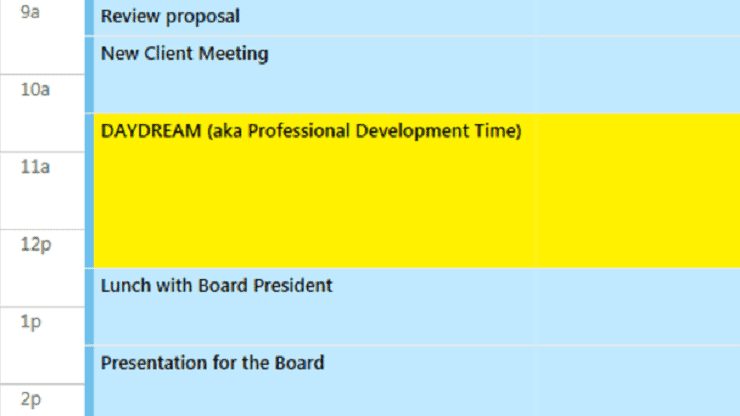
Were you aware that you can get ahead by daydreaming? At first blush this sounds ridiculous, but it’s neither snake oil nor a new idea. How many times have you heard, “it came to me in the shower” or “I’ll sleep on it” credited as problem solving techniques? We can probably all agree that letting your brain work without you directing it can sometimes lead to the best answers of all. So why not trust the same mechanism to help you realize life goals?
In Psychology Today , Scott Barry Kaufman, the Scientific Director of The Imagination Institute in the Positive Psychology Center at the University of Pennsylvania, mapped the connection between daydreams and achieving life goals. While there is a lot of serious science behind it – from brain mapping to social research to a 30-year longitudinal study – it comes down to a few pillars of truth that are surprisingly easy to get behind:
1. Not all styles of daydreaming benefit the dreamer equally. Of the three distinct daydreaming styles classified by researchers, dreamers who practice a positive, elaborate, future-oriented daydreaming style are more likely to be successful at reaching their goals compared to those who practice short-term or anxious styles of daydreaming.
2. The practice of daydreaming develops desirable traits for success. A daydream is essentially a simulation that the dreamer must build, sustain and control. The daydream provides an environment in which the dreamer can visualize her success and practice strategies for achieving it. Likewise, daydreaming helps dreamers improve self-control and develop creativity.
3. Being able to focus internally is essential to achieving your goals. With all the external noise from today’s world, it requires real discipline to focus internally (try making that argument to the 4th grade teacher who caught you daydreaming!). This type of focus helps the dreamer establish a balance between internal and external demands, long-term goals and short-term needs, mindfulness and social awareness – all while keeping the dreamer’s life agenda front and center.
For so long, daydreaming has been associated with laziness and a lack of ambition, but that could be an unfair interpretation based achieving short-sighted results (does forgetting bread at the store because you were envisioning being elected to City Council mean you’re not focused or just focused on something more important to you?)
In the long run, it may be that daydreaming actually affords dreamers an advantage over non-dreamers. So why not block out some professional development time in your calendar today, and see where your daydreams take you.

